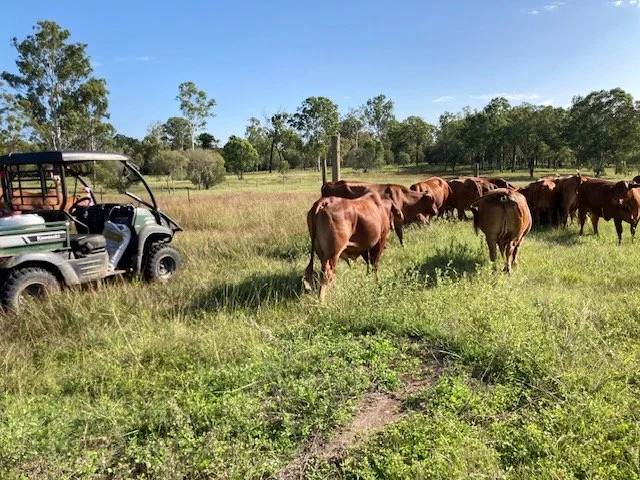The Duncan Carbon Project has achieved successful issuance of ACCUs under the ACCU Scheme, through rotational grazing and infrastructure upgrades across the Irisvilla property in Colosseum, Queensland.
Landholders Lance and Kylie Stephenson implemented a cell grazing system across 38 paddocks, lifting stocking rates from 20 to 45 DSE/ha and using digital livestock insights to support on-farm decision making.
The Stephensons have received 6,254 ACCUs under the Australian Government’s ACCU Scheme. The credits validate the measurable increase in soil carbon generated through their farm-led management changes.
13 November 2025: The Duncan Carbon Project, located on the Irisvilla property in Queensland and managed by Lance and Kylie Stephenson, has reached a key milestone with the issuance of 6,254 ACCUs under the Australian Government’s ACCU Scheme.
The project, developed in partnership with AgriProve, reflects a broader transformation in grazing management. The Stephensons shifted from traditional set-stocking across four paddocks to a 38-paddock rotational grazing system that includes three biosecurity paddocks and allows for extended pasture rest and recovery.
As fourth-generation graziers, Lance and Kylie introduced fencing upgrades, new water points and reseeding to support their new system. Their focus is on improving ground cover, grazing efficiency and herd productivity.
“We’ve got more grass, healthier cattle, and we’re spending less time and money feeding through the dry,” said Lance Stephenson. “It’s been a big shift in how we manage the land, but we’re already seeing the benefits. The carbon credits have added a new layer of value to what we were already working towards.”
The Duncan Carbon Project is also supported by CERESTAG devices and AgriProve’s READY GRAZE™ platform, which provide digital insights into animal movement, grazing patterns and infrastructure performance. These tools have helped align livestock decisions with the goals of the carbon project.
“We’d been improving the grazing system for years,” said Kylie Stephenson. “Once we saw how much ground cover we were building, it made sense to measure the impact and make carbon a part of the business strategy. The revenue from our first credits is already helping us invest back into the property, from fencing and inputs to pasture trials and herd improvement.”
The Stephensons are continuing to trial innovative inputs, including worm castings, organic distillery by-products and tailored nutrient brews to further build soil carbon and improve resilience.
Using AgriProve’s digitally enabled Soil Organic Carbon (SOC) model, the Duncan Carbon Project was able to achieve credit issuance before the maximum five-year reporting period. AgriProve conducts monitoring and third-party audits as soon as measurable carbon increases are identified. This ensures landholders receive the value of their impact sooner.
Quotes attributable to AgriProve General Manager Kieren Whittock:
“The Duncan Carbon Project is a great example of how productivity and carbon can work together. By refining their grazing system, the Stephensons are improving soil condition, lifting carrying capacity and building climate resilience.”
“At AgriProve, we take a soil-first approach - because when you improve your soil, everything else improves with it. Better soils lead to better pastures, better animals and better long-term business outcomes. The 6,254 ACCUs issued are a validation of the real, measurable impact Lance and Kylie have made through practical, data-driven management.”
“We are proud to support landholders like Lance and Kylie who are leading change on the ground and showing what’s possible when innovation, stewardship and profitability come together.”

